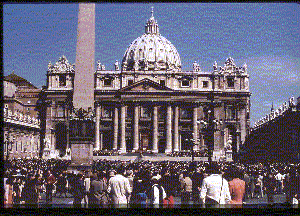 The plans of the Catholic Church and the Jesuits are being accomplished through
The plans of the Catholic Church and the Jesuits are being accomplished through
 The plans of the Catholic Church and the Jesuits are being accomplished through
The plans of the Catholic Church and the Jesuits are being accomplished through
Charta Oecumenica is a document signed by two great organizations: the Conference of European Churches (CEC) and the Catholic Bishop's Conference of Europe (CCEE). Notice that the second great organization is a Catholic organization.
What is striking, is that when we read through the document, it is nothing less than a continuation of what is revealed in the publication "The Work of the Jesuits in the New Millennium" (WJNM). If you have not already read this document, we recommend that you order it from the address on the back. Read it, and compare! This publication discusses the plans for the new millennium that the Catholic Church itself reveals on its Internet pages. It is remarkable how precisely the plans of the Jesuits have been put into practise in the new document Charta Oecumenica!
The Goal: Full Church Communion
In WJNM we wrote about the main goal of the Jesuits: Unity among all Christians. Is this also the goal of Charta Oecumenica? Let us read from point 5, § III: "Until we reach the goal of full church communion, we intend to act together in all matters in which no deep differences of conviction compel us to act separately." Did you notice that the goal of this document was defined, even though it was carefully concealed? The goal is "full church communion" - totally in harmony with the strategy of the Jesuits and the Catholic Church. And, not to say the least, it is also in harmony with what the Bible has foretold (Rev. 13. 8).
European Unity At All Levels
The next goal of the Jesuits we find in WJNM, p. 2, expressed in their own words: "Resist every temptation in the direction of individualism, independence, or parallelism..." and "overcome every temptation of provincialism, regionalism, or isolationism that could endanger the very existence of certain international and inter-provincial works of great importance for the universal church..." On page 5 in WJNM we also dealt with the Jesuits' delight in the political, economical, social and cultural bonds that are tied today, and how they expressed that it would be a shame if the same should not come to pass on the religious platform.
Charta Oecumenica also has an answer to this, and it is in perfect harmony with the goal of the Jesuits: "The churches are in favour of European unity. Ecumenism means, for Europe, that the process of European integration is not limited to politics and economics. Thus, on the basis of our common faith, we seek to preserve "Europe's soul"...We commit ourselves to promote the unity of Europe in all its cultural, ethnic and religious diversity..." -Point 7, § III.
In connection with this policy of gathering Europe and erasing religious differences, the integration of refugees is central. In WJNM we learnt that one of the main areas of the Jesuits' work was the integration of Aliens. This is also one of the goals in Charta Oecumenica: "We commit ourselves... to promote openness towards the increasing numbers of foreign persons, asylum-seekers and refugees, and to give homeless persons a refuge and a home in Europe" -Point 8, § III. First of all we have to say that we are really in favour of helping the poor and needy. It is a Biblical principle, and it would contradict the fundamentals of the Christian message to neglect this. But at the same time we have to be aware that there is a plan behind the integration we see today. We discover that often it is not the ones who need help the most that are taken care of. Since the Jesuits have such a purposeful plan for integration, it is obvious that many of those that are coming as refugees are a part of this plan, even though some are victims that need our help. Those who are working to bring about a universal church are in favour of mixing the cultures and religions. In this way they will more easily break down barriers, and bring about the unity they want. Therefore we think that refugees and others that are needy _ as far as possible _ should get help in their own country, or in neighbouring countries, where the situation is more peaceful. We need the Holy Spirit to relate to this problem in a balanced way. The Bible has good counsel in Acts 17. 26-27: "And [God] hath made of one blood all nations of men for to dwell on all the face of the earth, and hath determined the times before appointed, and the bounds of their habitation; That they should seek the Lord, if haply they might feel after him, and find him, though he be not far from every one of us..." It looks like God wants us to understand that an unbounded mixing of religions and cultures has never been an advantage - actually it says that He has set "the bounds of their habitation; That they should seek the Lord..."
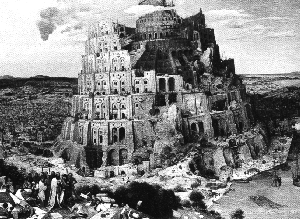 Lessons from the Tower of Babel
Lessons from the Tower of Babel
Obviously this was what led to the strange happenings at the tower of Babel. God's original plan was that everybody should scatter and populate the world, living together in a peaceful society (Gen. 1. 28). But when mankind sinned and evil grew, man began to actively cross the plans of God. Instead of scattering around the world, they gathered on a plain in the land of Shinar and started to build a tower that would rescue them in case there was a new flood. They tried to establish they own security - their own system, independent of God. The 11th chapter of Genesis opens with these words: "And the whole earth was of one language, and of one speech." Obviously this unity was a problem. Not because it was a problem in itself - God had created men like this, but in their sinful condition they used this unity to create and act out plans that were not according to God's will. Unity is in itself good, but if it is built on incorrect principles, and used as a tool to contradict the plans of God, division is far better. God had to make a settlement: "And the LORD said, Behold, the people is one, and they have all one language; and this they begin to do: and this they begin to do: and now nothing will be restrained from them, which they have imagined to do. Go to, let us go down, and there confound their language, that they may not understand one another's speech. So the LORD scattered them abroad from thence upon the face of all the earth..." 1. Mos. 11. 6-8.
Today the power elite of the world tries to build a new tower of Babel, not in the least through the EU system, and it is obvious that the religious powers are the leading forces this time. But we should carefully consider the lessons from the tower of Babel.
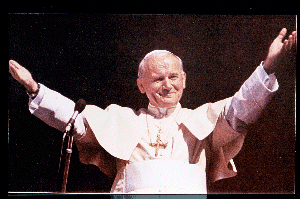 Dialogue is the Key Word
Dialogue is the Key Word
If you read the WJNM you may remember how strongly the Jesuits emphasized the key word, DIALOGUE. On page 2 we had, among others, the following quotations: "The Holy Father has time and again asked the Jesuits to bring about an inter-religious dialogue." And: "Inter-religious dialogue is an integrating element of the Jesuits mission..." Have the Jesuits also portayed this idea through the Charta Oecumenica? Yes - absolutely yes! Just listen to one of the headings in this document: "There is no alternative to dialogue". They continue to describe how the differences in the belief of the churches can easily lead to division, and then they say: "...communion among churches can have its theological basis only in agreement with the fundamental truths of our faith." Then we have to ratherdespise some of the important truths that we do not agree upon, and gather around that which is left - that which they say we have in common. And what is the key word to accomplish this? They continue: "Therefore dialogues must be conscientiously and intensively pursued at the various levels of church life. We commit ourselves to cultivate and deepen a culture of dialogue within and among the churches" and "in cases of controversy, especially with regard to ethical questions which threaten to split the ecumenical fellowship, to continue our dialogue together." _Point 5, § II.
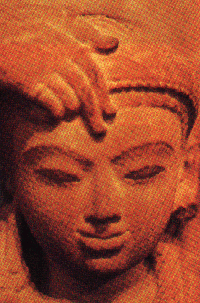 Also Jews, Muslims and Other Religions
Also Jews, Muslims and Other Religions
In WJNM, p. 2., we were looking at the Jesuit's plans of also entering into dialogue with Jews, Muslims and other religions. Among others we referred to the following quotation: "The dialogue with the Jewish people has a unique place", and "both the Church and the Jesuit Order have struggled to build bridges of mutual understanding between Christians and Muslims." By the way, the Jesuits also want to enter into dialogue with both Hindus and Buddhists. They emphasized that the "deep meditation", "mystical comprehension", and "rich symbolism" of the Hindus could open up for a "fruitful dialogue". They also found aspects of the Buddhist religion that could create a closer fellowship. They especially emphasized the "meditation that leads to a level of inner liberalism and spiritual enlightening."
The Jesuits split up their dialogue activity in at least two categories (WJNM, p. 3), and one of them is "The theological exchange dialogue", where specialists seek to deepen the understanding of the respective religious heritages, and to appreciate each other's spiritual values. In other words: by dialogue, and by appreciating differing aspects in other religions, they want to promote unity on their own premises. Is Charta Oecumenica following this principle too? In § III we read as follows: "We support the many and diverse forms of Christian-Jewish cooperation. We enter into meetings with Muslims and adherents of other religions in a spirit of respect and appreciation, and are making efforts towards mutual understanding."
How striking the words from the Bible are: "...and all the world wondered after the beast." Rev. 13. 3. (All the Biblical identifying marks of "the beast" fit the papacy.) We can clearly see that this is about to happen today.
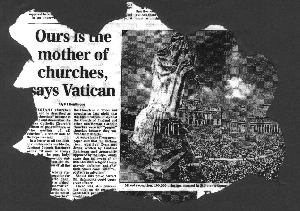 The Mother Church
The Mother Church
In this connection it is interesting to notice the concealed strategy of the Vatican. Even though they are promoting ecumenism and unity, they are not willing to unite except on their own premises. Concerning "unimportant issues" they may be willing to make concessions, but the Church is, for the most part, always the same, and the other churches have to subdue to its system.
The 4th of September, year 2000, a very interesting article was to be found in "The Daily Telegraph". The heading was as follows: "Ours is the mother of churches, says Vatican". The article quotes a very famous Catholic cardinal - Joseph Ratzinger: "It must be always clear that the one, holy, Catholic and apostolic universal church is not the sister, but the mother of all the churces."
This is a striking picture, which we also find in Revelation, chapter 17: The harlot. Of her it is written that she has a name written in her forehead: "Mystery, Babylon the great, the mother of harlots and abominations of the earth". In Biblical symbols a woman represents a church (e.g. 2Cor. 11.2...). A harlot - a prostitute woman - then must be a symbol of an apostate church - a church that has broken its connection with God by "committing adultery" with false teachings (see the book of the prophet Hosea). It is very striking that the Catholic Church calls itself the Mother Church, and as we have discussed in other publications this church really has committed "spiritual adultery".
But a harlot also has daughters, symbolizing the churches that are entering into relationships with her. Charta Oecumenica is just such a document between "the Harlot" and her daughters. We read that the Harlot was called "Babylon the great". Both the Catholic Church, and the churches that are opposing the clear teachings of the Bible and are entering into relationships with the Harlot, constitute what the Bible calls "Babylon". And the Bible urges us: "Babylon the great is fallen, is fallen... Come out of her, my people, that ye be not partakers of her sins, and that ye receive not of her plagues." (Rev. 18.2-4). We must come OUT of - not enter INTO - connections with Babylon. This appeal also shows us something more: God still has many of his children in Babylon, and we have a responsibility to inform them of the real situation, so they can be aware of the danger and escape before it is forever too late. God cares for these people, and we should possess the same care - and show it.
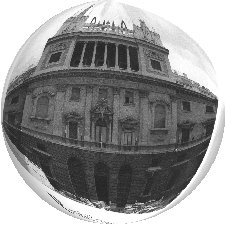 Through the education-system
Through the education-system
If we do not give the warning to come out of Babylon, who will? Can we expect the authorities of the countries to inform us about it, or that our children and youth will learn it in the schools or through the educational system? No, it is rather opposite. The educational system is pointed out as an effective tool of the Jesuits in their struggle for supremacy, and they use it most effectively. In WJNM, p. 5, we took a look at how the Jesuits considered the education as "very important", since it can provide "a solid academic and religious foundation during the formative years". Not in the least, the universities are attacked (see WJNM, p. 5-6). But even in the comprehensive schools we can see the results of the strategy of the Jesuits. In the religion classes they are promoting a pluralistic way of thinking, where the absolutes are dimmed out. Catholic principles are also presented. The children must learn Catholic history, their thinking-pattern, about the founder of the Jesuits: Ignatius de Loyola, and so on. The whole education system is shaping the children in a way that opposes the clear, distinct principles of the Bible. It is not amazing that more and more parents choose the concept of home schooling. They want to give their children the very best education from their childhood. We begin to realize that education is not the same as school, but that it actually embraces all you do in life. Everything is playing its part in shaping you _ the environment, the work you are doing, what you read, what you listen to, and what you see. As Christians, more and more parents want to give their children the best foundation, since they have realized that "by beholding we become changed" (see 2Cor. 3.18).
Back to Charta Oecumenica. Does it follow the Jesuit strategy? Let's read from point 2, § II: "We commit ourselves... to promote ecumenical learning in Christian education and in theological training and further education." How will we protect our children and youth against such a great influence? It is a question that needs thorough consideration.
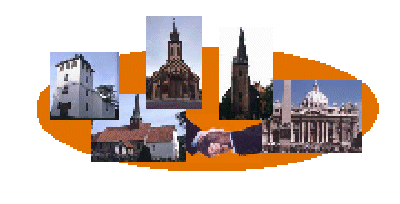
Avoid "stealing" membersA central point in Charta Oecumenica is what they themselves call "witnessing together to our faith". What do they mean by that? Let's look at what the document itself says: "In the face of the advancing secularisation and ebbing of Christianity in Europe, we resolve to strengthen one another in a common Christian witness to our faith, to a common evangelisation and mission in Europe. For this it is indispensable to restore trust and agreement among churches, in order to avoid hurtful competition and the danger of new divisions. It is important here to distinguish between church communities and sects." (Point 4, § II).
Practically this means that they all recognize each other as full worthy alternatives. They will seek to evangelise "together", but not "for each other's members". They are going to encourage their converts to join whichever church they choose, and not try to get them to convert to their own fellowship. How can Protestants unite with Catholics in such plans?
Liberty is in danger - the liberty to freely proclaim the biblical message, which also gives a straight warning against "the Beast" and "the Mark of the Beast". As you can study in other publications we have published, all the identifying marks of the Beast fit the papacy. But how can Protestants give such a warning when they enter into relationship with this system? Then others have to do the job, that are not bound by the silk robes of the power elite.
"Thy word is true"
If we really are going to be Christians, we cannot follow the way that is pointed out in Charta Oecumenica. The
Bible says: "Thy word is true from the beginning; and every one of thy righteous judgements endureth for ever." Psalm
119.160. And in the great commission we read that the Lord asks us to go out to mankind "teaching them to observe all
things whatsoever I have commanded you". Matt. 28.20. Jesus also says in Matt. 5. 18: "For verily I say unto you, till heaven
and earth pass, one jot or one tittle shall in no wise pass from the law, till all be fulfilled." James says: "For whosoever
shall keep the whole law, and yet offend in one point, he is guilty of all." (James 2. 10) And at last a few words from the
book of Revelation: "And if any man shall take away from the words of the book of this prophecy, God shall take away his
part out of the book of life..." (Rev. 22. 19) What is the essence of this? Right. It is totally out of harmony with the Bible to
just find some points to agree upon, and to leave out other important truths that one cannot agree upon. Mankind needs a
whole message - a message that teaches salvation and forgive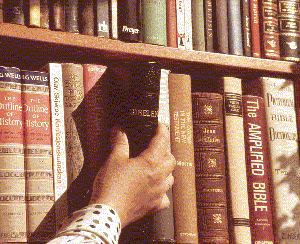 ness through Christ (1John 1.9), but does not stop there. We
need a message that also tells us that God has grace enough to keep us from continuing the old life of sin (1John 3.6-9).
A message that creates TRUE unity as Jesus said: "That they all may be one; as thou, Father, art in me, and I in thee, that
they also may be one in us..." (John 17.21). Jesus also gave us the basis of TRUE unity: "Sanctify them through thy truth:
thy word is truth." (John 17.17).
ness through Christ (1John 1.9), but does not stop there. We
need a message that also tells us that God has grace enough to keep us from continuing the old life of sin (1John 3.6-9).
A message that creates TRUE unity as Jesus said: "That they all may be one; as thou, Father, art in me, and I in thee, that
they also may be one in us..." (John 17.21). Jesus also gave us the basis of TRUE unity: "Sanctify them through thy truth:
thy word is truth." (John 17.17).
God's true church will not be a gigantic cathedral, it will not be an enormous ecumenical church, but "where two or three are gathered together in my name, there I am in the midst of them." (Matt. 18. 20) And these few, scattered all over the globe, will experience true spiritual unity. They will obviously meet a lot of opposition and trouble (Rev. 13. 8-17), but they will be safe, for the Lord has promised: "He that dwelleth in the secret place of the most High shall abide under the shadow of the Almighty... He shall cover thee with his feathers, and under his wings shalt thou trust: his truth shall be thy shield and buckler." (Psalm. 91. 1+4)
Best greetings from Bente and Abel Struksnes, Norway